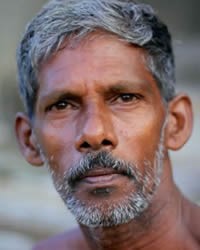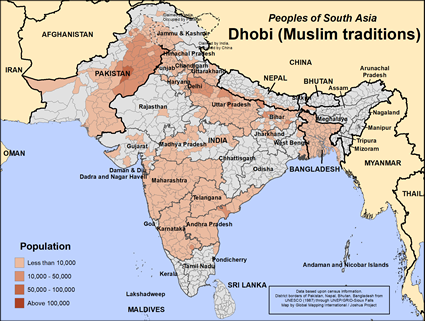Dhobi (Muslim traditions) in Bangladesh

Photo Source:
Oxlaey - Flickr
Creative Commons
|

Map Source:
People Group data: Omid. Map geography: UNESCO / GMI. Map Design: Joshua Project.
|
| People Name: | Dhobi (Muslim traditions) |
| Country: | Bangladesh |
| 10/40 Window: | Yes |
| Population: | 40,000 |
| World Population: | 2,345,400 |
| Primary Language: | Bengali |
| Primary Religion: | Islam |
| Christian Adherents: | 0.00 % |
| Evangelicals: | 0.00 % |
| Scripture: | Complete Bible |
| Ministry Resources: | Yes |
| Jesus Film: | Yes |
| Audio Recordings: | Yes |
| People Cluster: | South Asia Muslim - other |
| Affinity Bloc: | South Asian Peoples |
| Progress Level: |
|
Introduction / History
The Dhobi name means "wash," and this identifies their trade of being clothes washers. Some are Hindus while others are Muslim.
What Are Their Lives Like?
Despite the painful physical problems they endure in their work, older Dhobis often work hard so that their children can have an education and advance. There are many young Dhobis now working in the government, trade, business and other professions. Though most Dhobis are Hindu, many are Muslim.
Younger Dhobis are going into other fields of work, which may open more opportunities for them; this manual work is being replaced by washing machines by wealthy clients in India and Bangladesh.
What Are Their Beliefs?
For these Dhobi, being Muslim is part of their cultural identity. Working hard to provide for their families and praying to Allah are very important to them. To change any of this means they risk losing what is most important in their difficult lives, which are their families and religion.
What Are Their Needs?
Dhobis need job training. Their jobs are being replaced. People with the right skills can help them move forward with this practical need.
Prayer Points
Pray for Christians to help Muslim Dhobi people get the job training they need.
Pray the Muslim Dhobi would come to know Jesus and hear his teaching, such as Matthew 11:29 - "Take my yoke upon you and learn from me, for I am gentle and humble in heart, and you will find rest for your souls."
Pray for Muslim Dhobi disciples to make more disciples in Bangladesh.